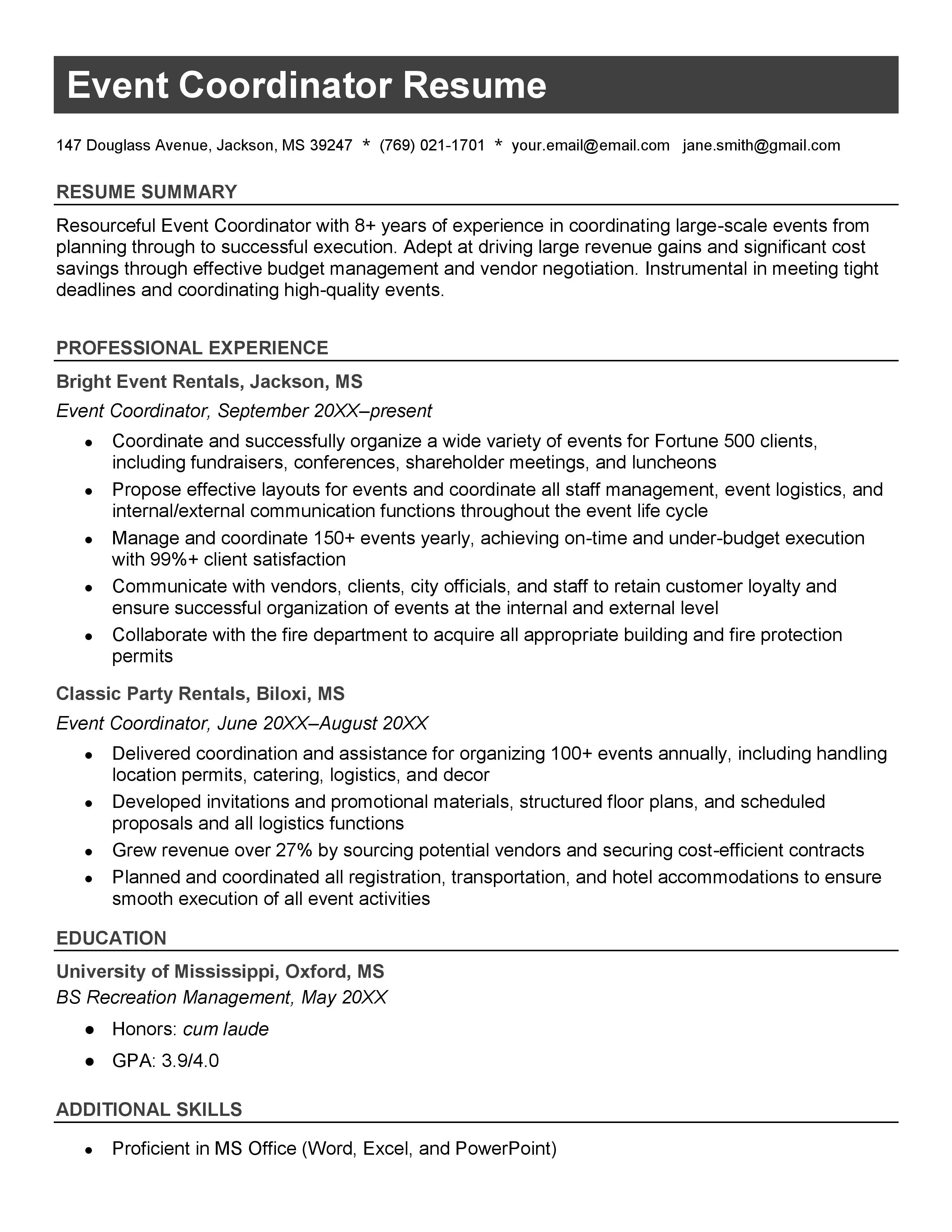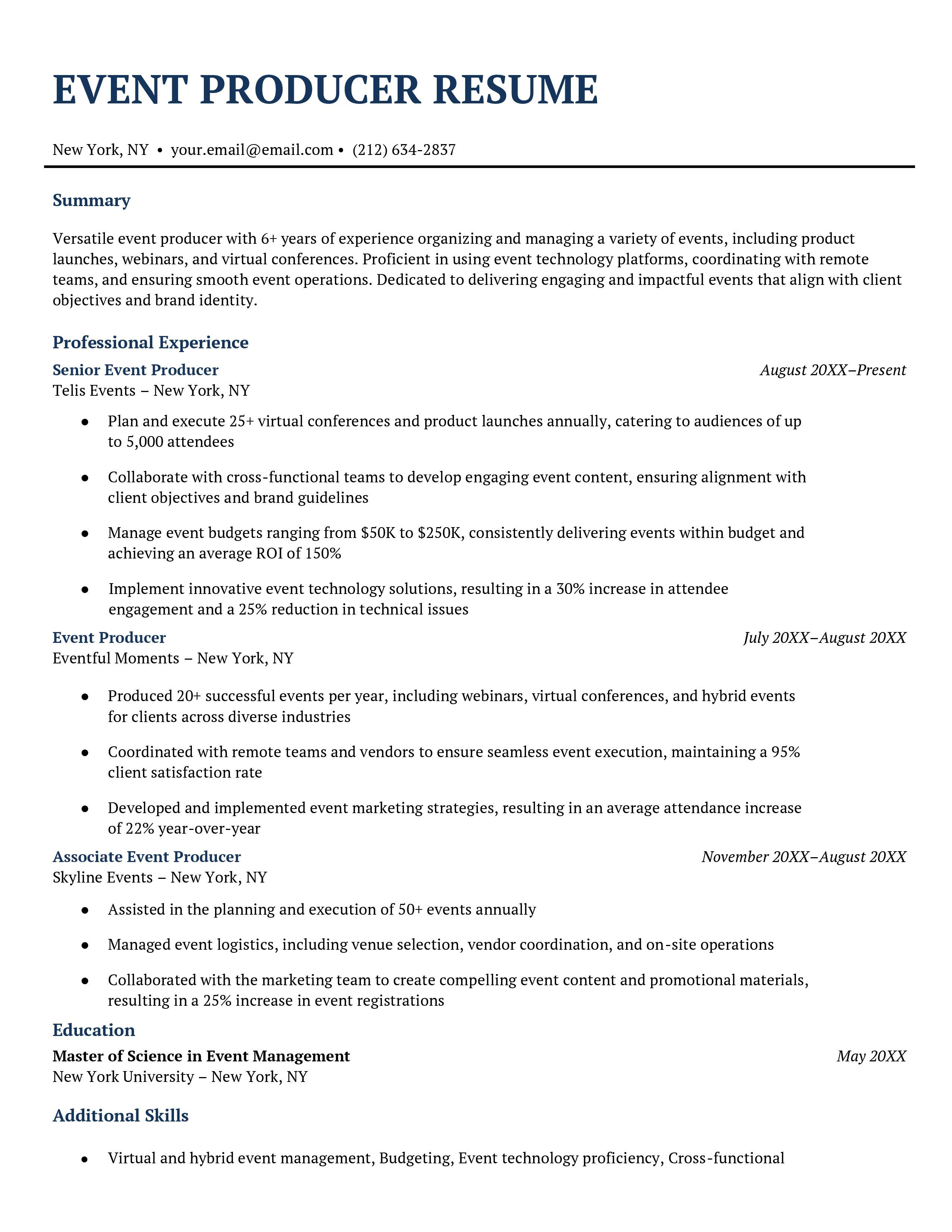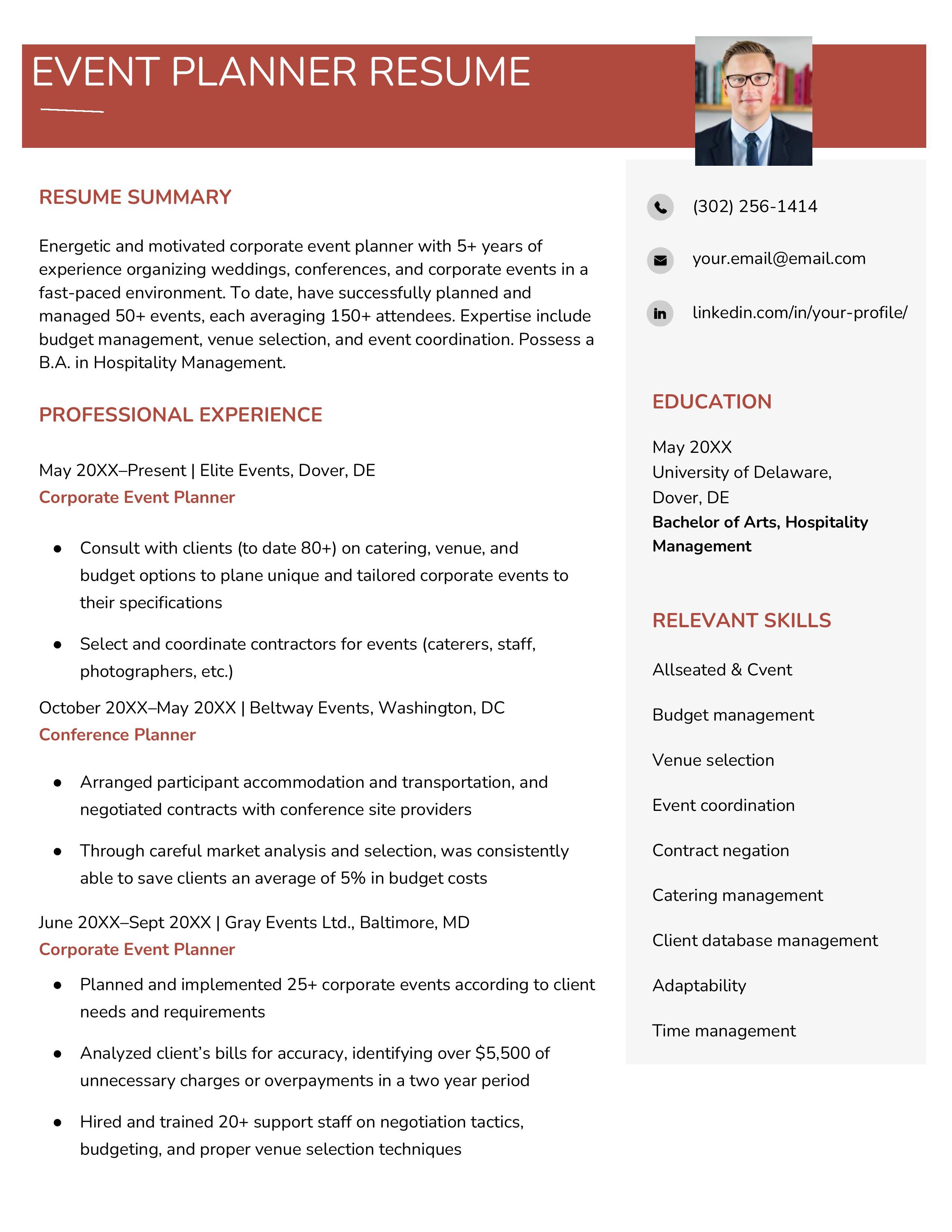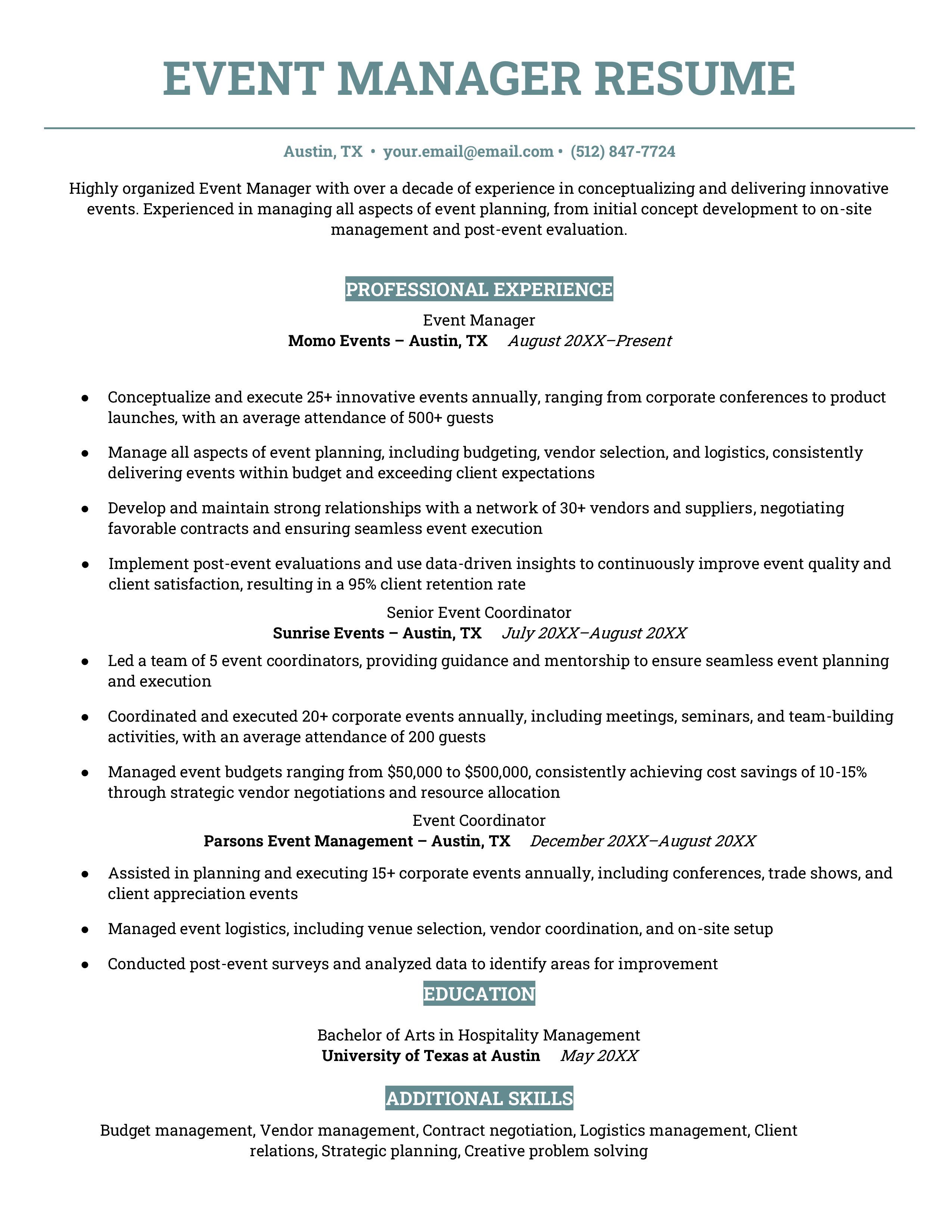Event Coordinator Resume: Tips, Skills, and Sample Guide
Published on September 30th, 2024
In the fast-paced and dynamic world of event coordination, your resume is the first encounter for showcasing the skills and experience that qualify you as an organizational powerhouse. Whether it's a corporate conference, wedding, or a large festival, an event coordinator's resume needs to convey the capability to manage details under stress, and work pressure, and deliver outstanding results.
In this blog, we are going to help walk you through the key components of an event coordinator resume, ensuring you stand out in the sea of applications and land your dream job in the exciting world of event planning.
About Event Coordinator
An event coordinator is the back frame of any real, glamorous event-from weddings and corporate conferences to festivals and fundraising events. They make sure all little and giant details are taken care of in full precision so that every experience is smooth. The event coordinator works hand-in-hand with clients, vendors, and teams to ensure everything runs like clockwork, on time, and within budget.
Check out free templates for event coordinator resumes.
Template 1
Template 2
Template 3
Template 4
1. Choosing the Right Format
Your resume should be as organized as the events you plan. A well-structured resume makes it easy for hiring managers to find information quickly. Let's outline three main formats to consider:
Chronological Resume: If you can boast of impressive work experience, then a chronological resume is just the thing for you. A chronological resume lists someone's work history in reverse chronological order, meaning by date, latest first. This format highlights consistent career development.
Functional Resume: If you are a beginner in your field of work or changing careers, your functional resume focuses more on your skills rather than on your work history.
Combination Resume: If you have some experience and a good skill profile, this format combines elements of both formats, using a balance between skills and job history to tell the rest of the story.
Keep it clean and easy to read. Use professional fonts such as Arial or Calibri, and make sure you incorporate white space to avoid overwhelming the reader.
2. Writing a Powerful Resume Summary or Objective
A resume summary is a placement opening pitch. It's a concise, strong statement that can reflect your professional background and career objectives. This section will immediately catch the attention of the hiring manager and encourage him to read further.
If you have years of work experience, then for one, go for a summary that would tell them about your expertise. Here's an example:
"Experienced Event Coordinator with over 7+ years experience in planning and executing corporate and social events. Proven success in managing budgets, coordinating vendors and delivering high-quality experiences under tight deadlines. Skilled in event logistics, team management, and creative problem-solving."
If you're just starting or transitioning into event planning, a career objective may be more suitable:
"Detail-oriented and highly organized individual looking to utilize project management and organizational skills as an entry-level Event Coordinator. Truly passionate about delivering unique events and experiences for clients."
3. Event Planning Experience
Event planning is about execution. Your work experience section is where you can show off how you've successfully managed and executed the various events. For each job, include:
Job Title: Use descriptive and accurate titles such as Event Coordinator, Events Planner, or Events Assistant.
Organization and Location: Identify the organization or agency you worked for.
Dates of Employment: Indicate the months and years served in the job.
Key Responsibilities and Achievements: Identify your responsibilities in bullet points, but center these around the results you achieved. For example:
"Designed and executed over 50 large corporate and social events with attendance from 50 to 1,000."
Wherever it is possible, give numeric proof of your achievements. Numbers and percentages correspond better to objective realities and demonstrate how capable you are at successfully producing and executing events.
4. Focus Skills
An event coordinator's resume should give a perfect mix of experience and skills. Anything on the list of communication, budgeting, project management, and vendor relations must be featured in an event coordinator's resume.
Project Management: One of the strong sides of project management is the events planning part of managing timelines, setting goals, and resources management.
Vendor Relations: one of the essential parts of catering, audio-visual equipment, venues, and other services coordination is the business.
Budgeting: Maintain events with budgeted costs. Emphasize the ability to control finances without trading off quality.
Multitasking: Manage multiple events, timelines, and vendors under one roof
Communication and Negotiation: Good communication and negotiation skills will be needed. Event coordinators have to communicate to various clients, vendors, and team members.
Event planning is no exception when it comes to unexpected challenges. Let your ability to think on the fly and solve problems as they arise shine through.
Details Matter: The thing about events is that they require only minuscule attention to detail to get everything right.
Make this section job-specific by listing the most relevant skills to the job description. Employers often scan resumes for specific keywords. Use as many terms from the job posting as possible.
5. Writing about Your Education and Certifications
Many event coordinators have a degree in hospitality, communications or marketing; however, formal education is not always required. Obtaining various certifications may give you an edge over others. If you have any courses taken or certifications obtained ensure that you include them in the lists. For example:
Bachelor's Degree: State the degree level achieved, major, and institution.
Certifications: Show any acquired certifications. Some examples of certifications include CMP and CSEP.
Workshops or Continuing Education: Don't forget any workshops or continuing education in event planning or project management.
Example: "Certified Meeting Professional (CMP), Event Leadership Institute – Completed 2022."
6. Volunteer Work and Side Projects
Volunteer work and personal projects can show that you want to work in events even if you have little to no experience. For example, such as:
Planned and executed a charity gala for 300 attendees and raised 50,000 for regional non-profits.
Volunteer as lead event coordinator for the annual community festival organizing logistics, entertainment, and vendors.
Such an experience might be just as enriching as paid work, especially in terms of experience that demonstrates organizational ability and commitment to the area involved.
7. Customize Your Resume for Each Job
In event planning, one size will most definitely not fit all. Tailor your resume to each job application, using the skills and experience directly relevant to the position. Present your resume in relation to the job description so that the use of pertinent keywords will catch his or her eye, especially those connected to the responsibilities listed in the job posting.
For example, if your work relates to corporate events, corporate clients, and general event operations, then be sure to bring those corporate experiences to the fore. If you are going to work with tight budgets, then be sure your budgeting experience and cost-cutting experience are brought to the forefront.
8. Design and Presentation
As an event coordinator, there is a great emphasis on details and presentation. Your resume should reflect your professionalism as well as your organizational skills. Clean and simple design using:
Professional Fonts: Easy-to-read fonts such as Arial, Calibri, or Times New Roman.
Bullet Points: Breaking down experiences and skills with bullet points for ease of reading.
Consistent Formatting: Use the same format for every detail in the resume from alignment, font size, and spacing, among others.
Final Words
It means that your event-coordinating resume should point out experience handling the multitude of moving parts that occur in planning and executing events. Demonstrating you're skilled at managing projects, dotting all the i's, and thinking on your feet under pressure will make hiring managers know that you are right for their team.
It is an event-planner representation, and you must take pride in putting it together to be organized, detailed, and tailored to each job opportunity. With the right resume at your side, you will surely get the job in your field and start planning events that just leave wonderful and lasting impressions on all participants.
Hire the best without stress
Ask us how
Never Miss The Updates
We cover all recruitment, talent analytics, L&D, DEI, pre-employment, candidate screening, and hiring tools. Join our force & subscribe now!
Stay On Top Of Everything In HR





